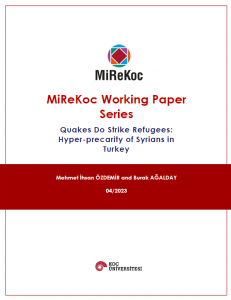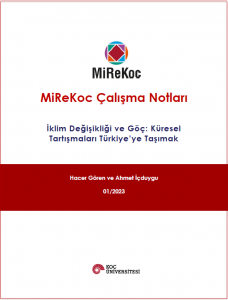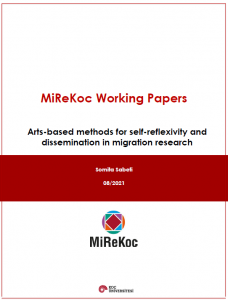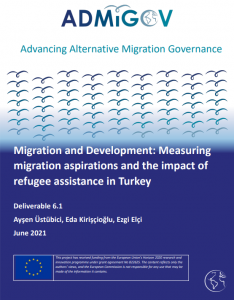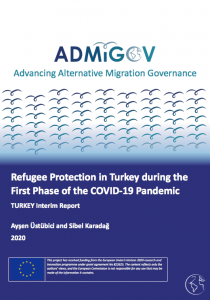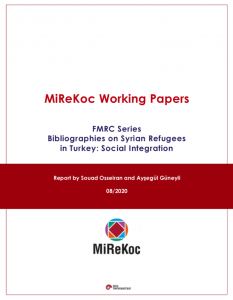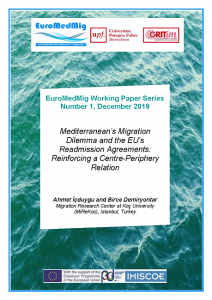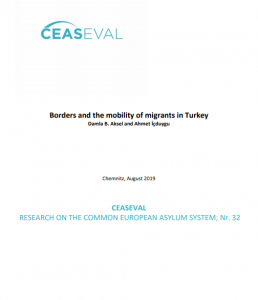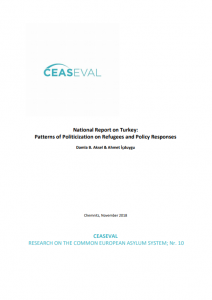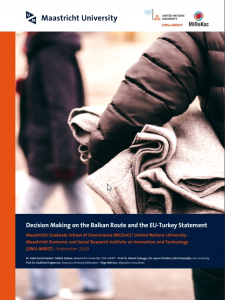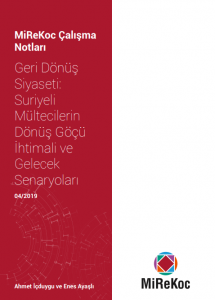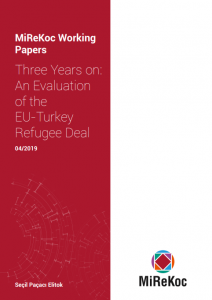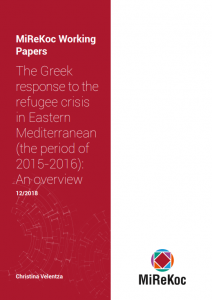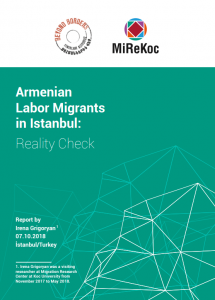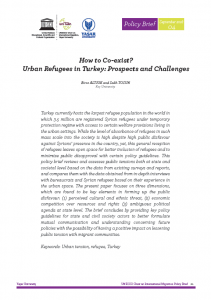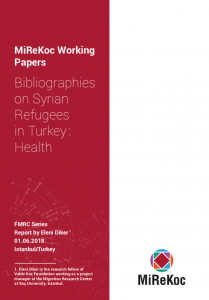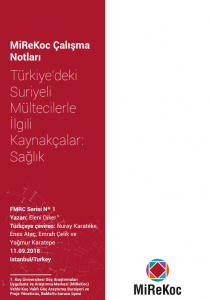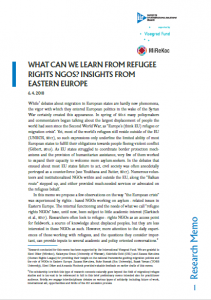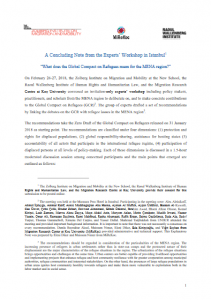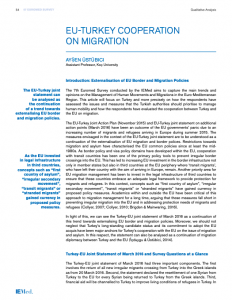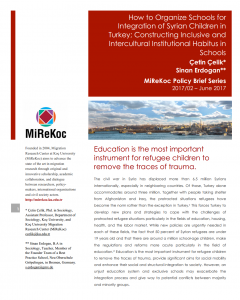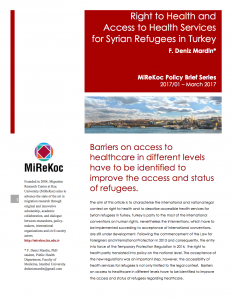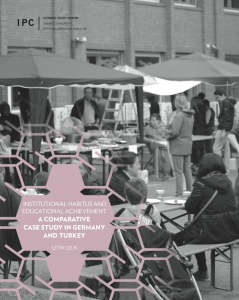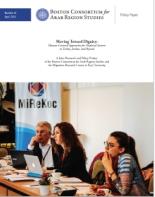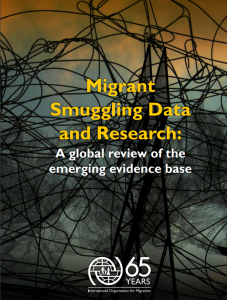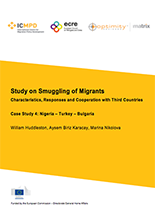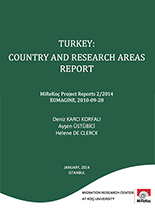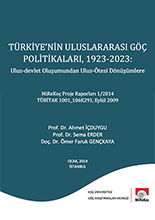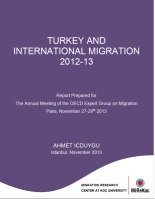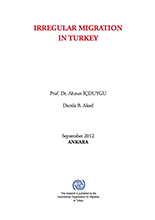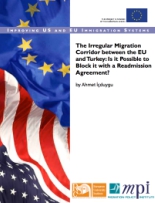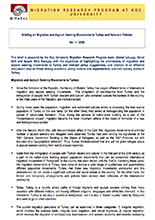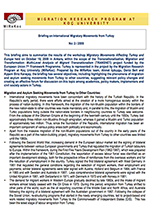Mehmet İhsan Özdemir and Burak Ağalday
Quakes Do Strike Refugees: Hyper-precarity of Syrians in Turkey
MiReKoc Working Paper Series 04/2023
On February 6th, twin earthquakes with magnitudes of 7.7 and 7.6 on the Moment Magnitude scale hit the southeast of Turkey wrecking ten provinces. Syrian refugees in Turkey are one of the communities which have been adversely affected by the disaster. The region hit by the earthquake hosts almost half of the total refugee population in Turkey. The provinces of Adıyaman, Hatay, Kahramanmaraş and the districts of Gaziantep alone accommodate nearly a million Syrian refugees and many thousand non-Syrian refugees. This paper explores the dimensions of refugee vulnerability in Turkey following the earthquake disaster.
Click here to access the article.
Hacer Gören and Ahmet İçduygu
İklim Değişikliği ve Göç: Küresel Tartışmaları Türkiye’ye Taşımak
MiReKoc Working Paper Series 01/2023
İklim değişikliği ve iklimsel felaketlerin göçü nasıl etkilediğine dair bilimsel çalışmalar, 1990’lardan itibaren hızlı bir ilerleme kaydetti. Özellikle son on yılda gerek nitel gerekse nicel anlamda bilimsel araştırmalarda hızlı bir dönüşüm gözlendi (Ghosh & Orchiston, 2022). Benzer şekilde, iklimsel felaketler nedeniyle yerinden edilen insanların özellikle ülke dışına bir hareketlilik söz konusu olduğunda- korunmasına yönelik mevcut yasal çerçeve ve mekanizmaların sayısında, yeterli olmasa da, özellikle son on- on beş yılda önemli bir artış görüldü (Aleinikoff & Martin, 2022). Böylesi hızlı bir gelişim seyri, birkaçının şu şekilde özetlenebileceği birçok soruyu beraberinde getirdi: “İklim değişikliğinin hangi etkileri daha çok hangi nüfus gruplarını, ne yönde göçe sevk ediyor?” (De Longueville vd., 2019); “İklim değişikliği diğer değişkenlerle nasıl bir etkileşim içinde? (Faist, 2020)”; “Göç, iklim değişikliğine karşı bir uyum stratejisi olabilir mi?” (Tan vd., 2015); “İklimsel nedenlerle ülke dışına göç söz konusu olduğunda bu insanların yasal statüsü ne olacak?” Bu kısa değerlendirme yazımıza, “iklim değişikliği ve göç ilişkisi ne değildir?” sorusunu sorarak zaman içerisinde evrilen temel birkaç eğilimi irdelemekle başlıyoruz. Ardından, 2000’lerin başlarına kadar zannedilenin aksine, iklim-çevregöç ilişkisinin hangi bağlamlarda, diğer değişkenlerle ayrılmaz bir bütün halinde göçü etkilediğine ışık tutuyoruz. Bunu yaparken, bu karmaşık ilişkiler ağının beraberinde getirdiği iki soruya cevap arıyoruz: “İklimsel felaketler nedeniyle göç edenler nasıl adlandırılmalı?” ve “Yasal çerçeve ve mekanizmalardaki boşluklar nelerdir?” Bu doğrultuda sunduğumuz önerileri takiben Türkiye’yi bekleyebilecek iklim göçü olasılıklarına değiniyoruz.
Click here to access the article.
Somita Sabeti
Arts-based methods for self-reflexivity and dissemination in migration research
MiReKoc Working Paper Series 08/2021
This working paper attempts to explore some of the perspectives and challenges on self-reflexivity and ethical considerations in qualitative research within the migration environment. The paper starts with a description of the master’s dissertation – a qualitative study which was carried out during a visiting research fellowship at MiReKoc and as part of the EMJMD Master MIM. Crossing the Mediterranean. It further explains how the field was approached by using observational sketching as a method for reflexivity and ethics, while taking into account its limitations and how these may be overcome in future studies. Lastly, the challenges and ways forward in using arts-based methods in the social sciences are presented.
Click here to access the article.
Ezgi Elçi, Eda Kirişçioğlu & Ayşen Üstübici
ADMIGOV Deliverable 6.1 2021
This report is written in the context of the ADMIGOV WP6, which focuses on the relationship between development interventions and migration aspirations and decisions at different stages of the migration cycle, including secondary movements from countries of first reception. Understanding this question is especially important to achieve the aims envisaged at New York Declaration of 2016 towards more predictable and comprehensive responses to “crisis” situations created by large scale displacements. Similarly, the Global Compact on Refugees, a non-binding international document adopted in December 2018, laid out the principles of international solidarity to address the needs of the displaced population by easing the pressures on host countries and enhancing refugee self-reliance.
Click here to access the article.
Ayşen Üstübici and Sibel Karadağ
Refugee Protection in Turkey during the First Phase of the COVID-19 Pandemic TURKEY Interim Report
ADMIGOV Country Interim Report, 2020
This interim report seeks to contribute to the contextualization of legal, political, medical and social aspects of protection on the basis of original field research conducted with a wide spectrum of actors working on the ground in the field of protection. How is protection understood from above or from below, in theory or in actual practice? By adopting a bottom-up approach in the study of protection, the report is structured on the basis of three key areas in protection: legal status, access to healthcare and access to shelter. The report particularly covers the period between February and June 2020 in Turkey at the time events at the Greek-Turkish border occurred and subsequently the novel COVID-19 pandemic started to drastically influence the displaced populations in need of protection.
Click here to access the article.
Souad Osseiran and Ayşegül Güneyli
FMRC Series Bibliographies on Syrian Refugees in Turkey: Social Integration
MiReKoc Working Papers, 2020 August
This is the second part in a series of five MiReKoc Forced Migration Resource Center Special Working Paper Series: Bibliographies on Syrian Refugees in Turkey.Various research on Syrian refugee presence in Turkey has examined different aspects including labor market integration, education access, health status and the like. The protracted nature of the displacement has resulted in growing interest in social cohesion and the status of relations between refugees and citizens. Unlike other topics of study, social cohesion presents certain difficulties due to the multiple definitions of the concept and methods to measure it (Özçürmez et al., 2020). This working paper presents assorted literature, academic and grey, exploring the social cohesion of Syrian refugees and their relations with Turkish citizens from multiple perspectives and approaches.
Click here to access the article.
Ahmet İçduygu & Birce Demiryontar
EuroMedMig Working Paper Series
Number 1, December 2019
The EU emphasis on externalisation of migration governance hinders cooperation in the Mediterranean and consolidates pre-existing power inequalities. The most controversial examples have emerged in the content and context of the EU-Turkey Readmission Agreement and the EU-Turkey Joint Statement. By analysing the case of Turkey and adding comparative perspective through the cases of Morocco and Tunisia, this article argues that the EU policy instruments of externalisation consolidate an asymmetrical relationship in the long run. They shift the economic, social, political and normative burden of migration management and reinforce a centre-periphery relationship between the EU-Med and non-EU Med regions.
Click here to access the article.
Damla B. Aksel & Ahmet İçduygu
Borders and the mobility of migrants in Turkey
Chemnitz, August 2019
CEASEVAL
RESEARCH ON THE COMMON EUROPEAN ASYLUM SYSTEM; Nr. 32
This report investigates the functioning of the European Union’s internal and external borders in the governance of migrants’ mobility, by looking at the case of Turkey, a non-member country that is directly affected by and is affecting the bordering processes of migrants and refugees within the EU. The analysis within this report aims to shed light on how the borders and the mobility of migrants of different statuses (irregular migrants, asylum seekers and refugees) in Turkey are interacting and delves into the bordering processes of pre-entry to the European Union and to further mobilities towards the EU. The report starts by presenting the legal national framework for the bordering of asylum-seekers and refugees in Turkey, by providing an overview of the current national context, as well as the existing legislation on border passages and the admission of migrants. Second, it evaluates the institutionalized bordering practices performed by institutional actors. Third, the report assesses the lived experiences of migrants and asylum seekers regarding borders and bordering practices in the geo-political, legal, social and economic spaces and discusses how these experiences have an impact on their mobility and immobility within and beyond Turkey. The final chapter examines (1) how actual borders have been defined and managed, based on the insights provided by different institutional actors, and how they were encountered according to the testimonies of migrants and asylum seekers, and (2) how the bordering processes in the legal, social and economic spaces in Turkey have an impact on the mobility or immobility of migrants and asylum seekers. The discussion illustrates that there was strong connection between the bordering processes in geo-political, legal, social and economic spaces, and the availability or the conditions of mobility experienced by migrants and asylum seekers. The institutional, legal and administrative mechanisms regarding the management of borders, migration and asylum determined available options that individuals had on mobility, yet they were open to change over time. Moreover, the findings of the fieldwork also illustrate that despite these structural conditions that asserted certain limitations, there is room for migrant agency to seek alternative paths for mobility.
For full-report, click here.
Damla B. Aksel & Ahmet İçduygu
National Report on Turkey: Patterns of Politicization on Refugees and Policy Responses
Maastricht Chemnitz, November 2018
CEASEVAL
RESEARCH ON THE COMMON EUROPEAN ASYLUM SYSTEM; Nr. 10
Over the past few years, Turkey has become a major country of transit and destination for refugees and migrants, positioned as the largest host of refugees in the world, with more than 3.5 million Syrian citizens living in the country. Although the sharp increase in the number of refugees in the country has started in the aftermath of Syrian civil war in 2011, the politicization of this issue in the country has taken place at a later period, intersecting with the mass exodus of asylum seekers and migrants towards the European Union (EU) in the summer of 2015. This report analyses the politicization on the issue of the management of refugees (the so-called refugee crisis) by specifically focusing on the relations between Turkey and the EU. It looks into two periods, or “episodes of contention”, during which “responsibility sharing” was discussed. These periods were chosen due to the major events that have
shaped the overall politicization of the management of migration and asylum in the context of the EUTurkey relations: (a) May 2015 to March 2016, when the mass influx asylum seekers and irregular migrants of Syrian and other origins from Turkey to the EU has taken place, which was directly followed by the negotiations and the signing of a Statement between Turkey and the EU; and (b) March 2017 to September 2017, when Turkey’s bilateral relations with the EU and some of its member states has been
strained, triggering renegotiations on Turkey’s candidacy in the Union as well as its involvement in the Custom’s Union. The report suggests that the salience of the politicization reached its peak point during the December 2015-March 2016 period, when the negotiations between Turkey and the EU have been very active, leading up to the March 2016 Statement. The analysis also illustrates that although there has been a consensus among the public opinion and representatives of the different political parties on the unequal sharing of responsibility between Turkey and the EU, there have been the emergence of a criticizing discourse by the opposition parties and human rights activists about how the AKP government managed the negotiations with the Union.
For full-report, click here.
Dr. Katie Kuschminder | Talitha Dubow, Maastricht University/ UNU-MERIT; Prof. Dr. Ahmet İçduygu | Dr. Aysen Üstübici | Eda Kirişçioğlu, Koc Univeristy; Prof. Dr. Godfried Engbersen, Erasmus University Rotterdam; Olga Mitrovic, Migration Consultant
Decision Making on the Balkan Route and the EU-Turkey Statement
Maastricht Graduate School of Governance (MGSoG) | United Nations University – Maastricht Economic and Social Research Institute on Innovation and Technology
(UNU-MERIT) | September 2019
The objective of this report is to examine how the package of policies associated with the Statement influenced refugees and migrants’ decision-making in Turkey and on the Western Balkans route to Europe between 2015 and 2018. The primary research question guiding this study is: How can the fluctuations in migration flows on the Balkans route from January 2015-December 2018 be explained? The methodology for this study includes a literature review, construction of a timeline of events from 2015-2018, and original interviews with 38 key stakeholders and 96 Afghan and Syrian respondents across the four countries of Bosnia and Herzegovina (32), the Netherlands (32), Serbia (27), Turkey (41). The results of the research lead to three overarching conclusions and implications. This report is the result of the study “Fluctuations in Migration Flows to Europe” commissioned by the WODC. This study has been guided by the comments of the Advisory Committee members.
To access the summary, click here.
For full-report, click here.
Ahmet İçduygu & Enes Ayaşlı
Geri Dönüş Siyaseti: Suriyeli Mültecilerin Dönüş Göçü İhtimali ve Gelecek Senaryoları
MiReKoc Working Papers, 2019 April
Geride bıraktığımız sekiz yılda, ülkelerinin dışında yaşayan yaklaşık altı milyon Suriyeli mültecinin geleceği ile ilgili akademik ve politik tartışmalar, uluslararası mülteci rejimi tarafından formüle edilen üç seçeneği işaret etmeye başladı:1 bulundukları ülkelerde entegrasyonları, üçüncü bir ülkeye yeniden yerleştirilmeleri ve Suriye’ye (gönüllü) geri dönüşleri. İlk iki seçeneğin, mültecilerin ilk gittikleri ya da mültecilerin gitmek istedikleri diğer ülkeler nezdinde yeterli bir biçimde karşılık bulamaması, geri dönüş fikrinin giderek daha öne çıktığını, bu çerçevede de bu seçeneğin hükümetler ve uluslararası kurumlar dahil olmak üzere birçok ilgili aktör tarafından teşvik edildiğini göstermektedir. Suriye’deki silahlı çatışmaların devam etmesine rağmen, farklı aktörler -mülteciler gönüllü olmasa bile- geri dönüşü savunan endişe verici bir eğilimi öne çıkarmaktan çekinmemektedirler. Bu makale ilk olarak Türkiye’deki mülteciler bağlamında ortaya çıkan geri dönüş tartışmalarına dikkat çekmekte; ikinci olarak ise geri dönüşün koşullarını bu tartışmalara ekleyerek, bugün için geri dönüşün önerilebilecek bir çözüm olmaktan oldukça uzak düştüğünü vurgulamaktadır. Bunu izleyerek, bu tartışmalar içinde mültecilerin bulundukları ülkelerde entegrasyonu ve üçüncü bir ülkeye yeniden yerleştirilebilme seçeneklerinin de uluslararası mülteci rejimi kapsamında hatırlanmasının gerekliliği savını ortaya atmaktadır.
Seçil Paçacı Elitok
Three Years on: An Evaluation of the EU-Turkey Refugee Deal
MiReKoc Working Papers, 2019 April
Since 2011, the civil war in Syria has displaced, both internally and externally, nearly 13 million people, more than half of the Syrian population. Turkey initially responded to large numbers of Syrians crossing its borders with an open-door policy (terminated by Turkey’s construction of a wall at the Syria border), and gradually came to incorporate temporary protection, non-refoulement, and humanitarian assistance into its response as the incoming flow of Syrian migrants continued. The European Union (EU)’s response to the refugee flows was mute until the summer of 2015, when the route of Syrian migrants changed course towards EU states and over a million refugees arrived in Europe The EU-Turkey deal opened a new venue within the policy debate on migration that has been present between the EU policy elite and Turkish government, and migration governance became one of the most controversial issues of our time. This paper takes its motivation from these developments and evaluates the EU-Turkey deal in its third year in a descriptive manner.
Christina Velentza
MiReKoc Working Papers, 2018 December
The Mediterranean has become the world’s most deadly crossing point for migrants. In 2015, there were 856,732 recorded arrivals in Greece as well as an estimated total of more than 6,600 missing persons or deaths in the Central and Eastern Mediterranean routes in 2015 and first half of 2016.1 The aim of this briefing paper is to assess how Greece responded to this influx, and identify lessons for addressing situations of large scale refugee movement at a European and global level. Based on research and fieldwork in Greece, mainly in Athens and Lesbos, this paper focuses on the critical period October 2015-May 2016 which saw high flows of asylum seekers into Greece and which predates the EU-Turkey deal agreed in March 2016. The paper focuses on the ways in which the Greek government and EU struggled to address the crisis during that period, outlining the challenges of implementing sustainable solutions and efficient policies given obstacles at national and European level. In particular, it focuses on the island of Lesbos, the main entry point of refugees from Turkey to Greece particularly on the island’s reception capacity. The findings highlight the need for a more effective common asylum system in the EU that includes adequate support and assistance to frontline states, and makes some suggestions for preventing future crises in situations of large-scale arrivals
Irena Grigoryan
Armenian Labor Migrants in Istanbul: Reality Check
Migration Research Center, 2018
This paper is a descriptive report about the realities of the Armenian labor migrants in Istanbul. With the absence of open borders, diplomatic relations, formal economic ties and compromising historical narratives between the Armenian and Turkish states the report finds the situation of Armenian labor migrants in Istanbul to be of particular precariousness, volatility and vulnerability. The purpose of the report is to identify the gaps of knowledge and emerging patterns in the dynamically developing picture of the Armenian migrants in Istanbul. The report develops a general descriptive picture of the migrant groups, complete with analytical thoughts and notes on the collected data. Particular attention is given to the description of human fabric, settlement, employment, incorporation and social networking spaces of the Armenian migrants in Kumkapı (Fatih) and Kurtuluş (Şişli) neighborhoods of Istanbul, based on profiling check-ups of 40 migrants and semi-structured in-depth interviews of 15 migrants. The added value of this report is providing recommendations to academicians, civil society and policymakers on the need of future research and actions to address the existing information gaps and understand the development patterns of this specific community of migrants.
Birce Altıok and Salih Tosun
How to Co-exist? Urban Refugees in Turkey: Prospects and Challenges
UNESCO Chair on International Migration, Yaşar University, 2018
Turkey currently hosts the largest refugee population in the world in which 3.5 million are registered Syrian refugees under temporary protection regime with access to certain welfare provisions living in the urban settings. While the level of absorbance of refugees in such mass scale into the society is high despite high public is favour against Syrians’ presence in the country, yet, this general reception of refugees leaves open space for better inclusion of refugees and to minimize public disapproval with certain policy guidelines. This policy brief reviews and assesses public tensions both at state and societal level based on the data from existing surveys and reports, and compares them with the data obtained from in-depth interviews with bureaucrats and Syrian refugees based on their experience in the urban space. The present paper focuses on three dimensions, which are found to be key elements in forming up the public disfavour: (1) perceived cultural and ethnic threat, (2) economic competition over resources and rights (3) ambiguous political agenda at state level. The brief concludes by providing key policy guidelines for state and civil society actors to better formulate mutual communication and understanding concerning future policies with the possibility of having a positive impact on lessening public tension with migrant communities.
Eleni Diker
Bibliographies on Syrian Refugees in Turkey : Health
MiReKoc Working Papers, FMRC Series, 2018
This is the first part in a series of five MiReKoc Forced Migration Resource Center Special Working Paper Series: Bibliographies on Syrian Refugees in Turkey. The working papers, which will be published every four months, aim to compile resources that examine the status of Syrian refugees in Turkey in five critical policy areas: (1) health, (2) education, (3) labor market (4) shelter and (5) social inclusion. They will draw on scholarly literature, publications of nongovernmental organizations and international organizations, and legislative documents defining the framework of the relevant policy field concerning refugees. Each working paper will be composed of a list of available studies that aim to answer at least one of the following questions: 1) What is the legal framework surrounding refugees access to this policy area? 2) What are circumstances/conditions of Syrian refugees in this policy area? 3) What is the impact of the presence of Syrian refugees on this policy area?
Eleni Diker
Türkiye’deki Suriyeli Mültecilerle İlgili Kaynakçalar : Sağlık
MiReKoc Çalışma Notları, 2018
Bu çalışma notu, Türkiye’deki geçici koruma altındaki Suriyeli mültecilerle ilgili tematik konularda yapılmış olan çalışmaların derlemelerini içerecek olan MiReKoc Zorunlu Göç Kaynak Merkezi (FMRC) Özel Serisi’nin ilk raporudur. Her dört ayda bir yayınlanacak olan çalışma notları, Türkiye’de geçici koruma altındaki Suriyeli mültecilerin durumunu sırasıyla; (1) sağlık, (2) eğitim, (3) istihdam, (4) barınma ve (5) sosyal uyum alanlarında inceleyen kaynakları bir araya getirmeyi hedeflemektedir. Bu serideki çalışma notları; belirlenen politika alanının mültecileri kapsayan çerçevesini tanımlayan mevzuata dair belgelerden, akademik literatürden, sivil toplum örgütlerinin ve uluslararası örgütlerin yayınlarından yararlanacaktır. Her çalışma notu, aşağıdaki sorulardan en az birine cevap veren çalışmaların listesinden oluşacaktır: 1) Mültecilerin bu politika alanına erişimlerini sağlayan yasal çerçeve nedir? 2) Suriyeli mültecilerin bu politika alanındaki koşulları nedir? 3) Suriyeli mültecilerin varlığının Türkiye’de bu politika alanına etkisi nedir?
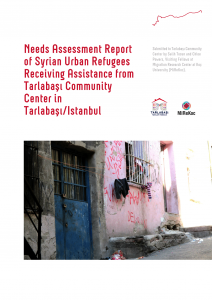
Salih Tosun & Chloe Powers
2018
Lucia Najslova & Ayşen Üstübici
What Can We Learn From Refugee Rights NGOs? Insights from Eastern Europe
2018
Eleni Diker & Maissam Nimer
2018
Ayşen Üstübici
The EU-Turkey cooperation on migration
7th Euromed Survey of Experts and Actors, Qualitative Analysis, March 2017.
Çetin Çelik & Sinan Erdoğan
MiReKoc Policy Brief Series 2017/02 – June 2017
F. Deniz Mardin
Right to Health and Access to Health Services for Syrian Refugees in Turkey
MiReKoc Policy Brief Series 2017/01 – March 2017
Çetin Çelik
Institutional Habitus and Educational Achievement: A Comparative Case Study in Germany and Turkey
Istanbul Policy Center, February 2017
A Joint Research and Policy Project of the Boston Consortium for Arab Region Studies and the Migration Research Center at Koç University
Moving Toward Dignity: Human-Centered Approaches for Displaced Syrians in Turkey, Jordan and Beyond
April 2016
The report is the result of a collaboration between the International Organization for Migration and researchers from a range of backgrounds and academic disciplines, and supported by the Government of Turkey. Chapter 6 Turkey part is written by Ahmet İçduygu and Sebnem Koser Akcapar.
Migrant Smuggling Data and Research: A global review of the emerging evidence base, Marie McAuliffe and Frank Laczko (eds)
2016
Damla B. Aksel, Jenny Andersson-Pucher, Angeliki Dimitriadi, Michaela Maroufof, Maegan Hendow, Ahmet İçduygu, Ayşem Biriz Karaçay
Study on Smuggling of Migrants. Characteristics, Responses and Cooperation with Third Countries. Case Study 3: Pakistan-Turkey-Greece
International Centre for Migration Policy Development, 2015
Deniz Karcı Korfalı, Ayşen Üstübici, Helene de Clerck
Turkey: Country and Research Areas Report
Migration Research Center, January 2014
Ahmet İçduygu, Sema Erder, Ömer Faruk Gençkaya
Türkiye’nin Uluslararası Göç Politikaları, 1923-2023: Ulus-devlet Oluşumundan Ulus-Ötesi Dönüşümlere
Migration Research Center, January 2014
Ahmet İçduygu
Turkey and International Migration. Report Prepared for the Annual Meeting of the OECD Expert Group on Migration
Migration Research Center, November 2013
Ahmet İçduygu and Damla B. Aksel
Irregular Migration in Turkey
International Organization for Migration, 2012
Ahmet İçduygu
The Irregular Migration Corridor between the EU and Turkey
EU-US Immigration Systems 2011/14
Eleni Diker & Maissam Nimer
A Concluding Note from the Experts’ Workshop in Istanbul: What does the Global Compact on Refugees mean for the MENA Region?
Çetin Çelik & Sinan Erdoğan
MiReKoc Policy Brief Series 2017/02 – June 2017
F. Deniz Mardin
Right to Health and Access to Health Services for Syrian Refugees in Turkey
MiReKoc Policy Brief Series 2017/01 – March 2017
Çetin Çelik
Institutional Habitus and Educational Achievement: A Comparative Case Study in Germany and Turkey
Istanbul Policy Center, February 2017
A Joint Research and Policy Project of the Boston Consortium for Arab Region Studies and the Migration Research Center at Koç University
Moving Toward Dignity: Human-Centered Approaches for Displaced Syrians in Turkey, Jordan and Beyond
April 2016
Damla B. Aksel, Jenny Andersson-Pucher, Angeliki Dimitriadi, Michaela Maroufof, Maegan Hendow, Ahmet İçduygu, Ayşem Biriz Karaçay
Study on Smuggling of Migrants. Characteristics, Responses and Cooperation with Third Countries. Case Study 3: Pakistan-Turkey-Greece
International Centre for Migration Policy Development, 2015
Deniz Karcı Korfalı, Ayşen Üstübici, Helene de Clerck
Turkey: Country and Research Areas Report
Migration Research Center, January 2014
Ahmet İçduygu, Sema Erder, Ömer Faruk Gençkaya
Türkiye’nin Uluslararası Göç Politikaları, 1923-2023: Ulus-devlet Oluşumundan Ulus-Ötesi Dönüşümlere
Migration Research Center, January 2014
Ahmet İçduygu
Turkey and International Migration. Report Prepared for the Annual Meeting of the OECD Expert Group on Migration
Migration Research Center, November 2013
Ahmet İçduygu and Damla B. Aksel
Irregular Migration in Turkey
International Organization for Migration, 2012
Ahmet İçduygu
The Irregular Migration Corridor between the EU and Turkey
EU-US Immigration Systems 2011/14
